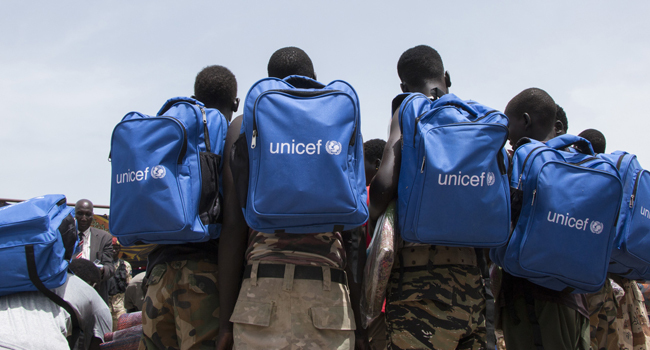The United Nations Children’s Fund (UNICEF) has collaborated with Jigawa State and 14 other Nigerian states to implement the Safe School Policy, addressing growing concerns about the safety of educational institutions across the country.
This initiative, designed to protect schools from attacks by non-state actors, was a key focus during the inauguration of the Jigawa State Committee on Safe Schools in Dutse on Friday.
In his presentation, Mr. Muttaka Muktar, Education Specialist at UNICEF’s Kano Field Office, emphasized the concerning rise in school closures due to ongoing security challenges.
“More than 910 schools have been destroyed by non-state actors, and at least 1,500 have been forced to close down across Nigeria,” Muktar stated.
He added that attacks on schools have intensified in recent years, particularly in the North-East, where the abduction of students has become a recurring issue.
“Armed groups have targeted approximately 1,500 schools since 2014, leading to the abduction of at least 1,413 students and 21 teachers, with 16 fatalities recorded. As of now, at least 867 schools remain closed nationwide,” Muktar revealed, underscoring the need for the Safe School Policy to be implemented in more states.
The importance of this initiative is underscored by the closure of hundreds of schools, which has deprived thousands of children of access to education.
These closures have led to significant disruptions in learning, increased school dropout rates, and worsened the already critical issue of out-of-school children in Nigeria.
The Nigerian government had previously endorsed the Safe School Declaration (SSD) in 2015, with former President Muhammadu Buhari formalizing the commitment by signing the SSD Ratification Document in December 2019.
To strengthen this effort, the National Policy on Safety, Security, and Violence-Free Schools was approved in August 2021, providing a framework for safeguarding educational institutions.
With UNICEF’s assistance, several states, including Jigawa, have developed implementation plans to localize the Safe School Policy.
However, Muktar emphasized the urgency of scaling up efforts. “While there has been a gradual year-on-year improvement, we still have a long way to go in ensuring that schools are safe for all children,” he said.
The newly inaugurated 32-member Jigawa State Safe School Committee will be responsible for implementing the policy in the state.
The committee comprises representatives from various sectors, including education, finance, security, local government, civil society organizations, development partners, traditional institutions, and other critical stakeholders.
In his address, Prof. Isa Yusuf-Chamo, the Jigawa State Commissioner for Education, praised the initiative and called on committee members to show commitment and diligence in carrying out their responsibilities.
“The selection of committee members was based on their relevance and track record of hard work. We expect nothing less than dedication in implementing this crucial policy to secure our schools,” Yusuf-Chamo said.
The Executive Secretary of the State Emergency Management Agency (SEMA) and a member of the committee, Dr. Haruna Mairiga, lauded the collaboration with UNICEF, noting its importance in addressing the pressing educational challenges in Jigawa.
“This partnership with UNICEF is a significant step toward restructuring and improving education in our state. The commitment of Governor Umar Namadi in prioritizing education safety cannot be overstated,” Mairiga remarked.
The Jigawa State Safe School Committee will begin its duties immediately, operating under terms of reference developed collaboratively by the state government and UNICEF.
The committee’s work will be vital in addressing the lingering security threats to education and ensuring that learning institutions remain sanctuaries for children rather than targets for armed groups.



